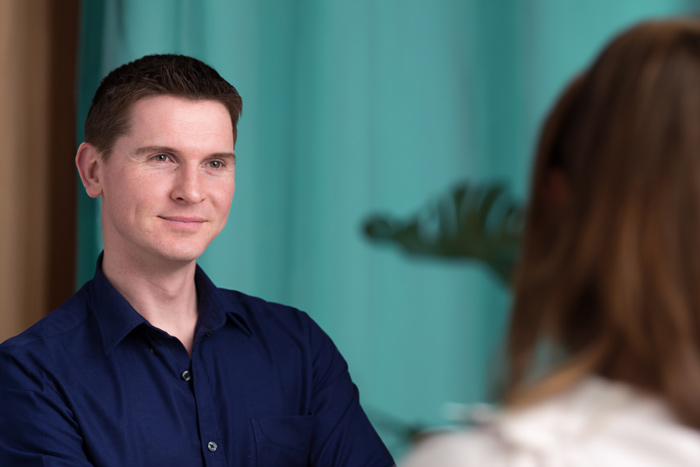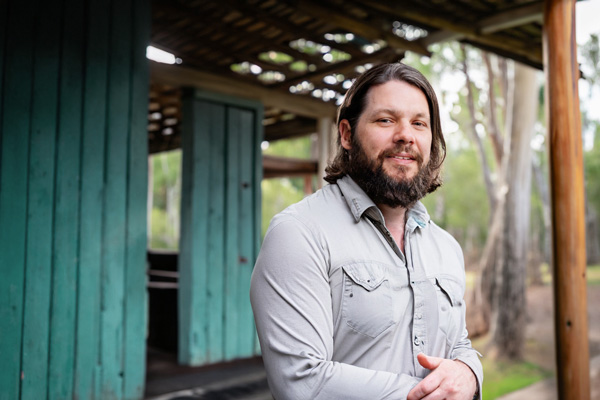Sydney Psychologists That Speak Your Language
Finding a psychologist in Sydney that will talk to you like a human being shouldn’t be a chore.
Transform Your Goals Into Gains
Work, kids, relationships, health – there’s a lot going on in your life at any moment! Cadence Psychology is here to teach practical skills that can help you overcome the hurdles in life that make living your best life that little bit harder.
Our Clinical Psychologists treat adults aged 18 years and above. With customised treatments, we’re dedicated to creating change that matters to you.
We believe that you come to therapy with everything you already need; our job is to help you tune in to your inner wisdom so you can keep moving forward.

What you get with Cadence Psychology:
- A stable and trusted local practice
- Seasoned Sydney psychologists with over 15 years experience
- Transparent treatment plans that don’t beat around the bush
- Change not chit-chats
Meet Our Sydney Psychologists

Dr Clinton Moore is Cadence Psychology’s principal clinical psychologist with over 15 years experience working with adults. His focus is on finding ways to boost motivation when clients are feeling stuck and struggling to meet their goals.
Ready to start making change? Contact Dr Clinton Moore today using either the email form below or ring on 0478 876 678 to get started.
How We Can Help You
Change starts with honesty. We won’t claim to be able to treat every problem on earth, but our therapists are great at collaborating with you to work thought the following emotional and life issues for adults:
- Addictions
- Anger
- Burnout
- Chronic pain
- Depression
- Exam anxiety
- Generalised anxiety
- Geriatrics
- Grief and loss
- Life transitions
- Motivation
- OCD
- Perfectionism
- Phobias
- Procrastination
- Relationships
- Self-esteem
- Sex therapy
- Sleep issues
- Social anxiety
- Stress
- Time management
- Trauma
- Work/life balance

Evidence-Based Psychological Treatments
Therapy isn’t about mysticism. After your initial assessment we’ll be upfront about the type of therapy that we plan to use.
We focus on evidence-based treatments including Cognitive-Behavioural Therapy (CBT), Acceptance and Commitment Therapy (ACT), and Schema Therapy to help bring about practical change in your life.
And by balancing skill development with an understanding of where your old habits came from we strive to ensure you receive a therapy experience that improves your quality of life in the long term.
Face-to-Face and Online Sydney Psychologists
Location shouldn’t get in the way of your well-being. We provide both face-to-face and telehealth session options so that you can choose the option that works best for you.
Our Sydney psychologists are fully trained to provide the most up-to-date evidence-based treatments in either format.

First Time Seeing a Psychologist in Sydney?
When you first contact us to make a booking we’ll find you an appointment and schedule in a time for an initial chat over the phone to determine your needs. We’ll also send out a Welcome Pack with everything you need to bring to the first session with your psychologist.
At your first face-to-face session (50 minutes) your psychologist will invite you into the room and conduct and initial assessment where the two of you can create a shared understanding of whatever you’re stuck on at present. From there the two of you will determine a pathway forward to achieve your goals.
Future sessions (50 minutes) will seek to implement your shared plan using a range of evidence-based psychological techniques and strategies.
Rebates and Fees
Cadence Psychology’s Clinical Psychologist’s charge $240 per 50-minute session ($260 for sessions after 5pm). This is significantly less than the Australian Psychological Society’s recommended rate of $280 per session.
If you have a Mental Health Care Plan from your Doctor you can obtain up to 10 sessions per year with a Medicare rebate of $141.85.
We also provide HICAPS payments for those clients who wish to use their private health insurance.

Sydney Psychologist FAQs
-
What is the best type of psychological therapy for adults?
There is no best single form of psychological therapy. However, the most prominent and common forms of treatment have all been tested under randomised-controlled trials to provide their effectiveness. These include cognitive-behavioural therapy (CBT), psychodynamic therapy, acceptance and commitment therapy (ACT), and mindfulness-based cognitive therapy (MBCT). Each therapy has the same aim of helping a client improve their well-being, with different approaches and terminology being used that are likely to appeal to different types of people.
-
What is the difference between a Registered Psychologist and Clinical Psychologist?
In Australia, psychologists who provide therapy are all certified as registered psychologists by the Australian Health Practitioner Regulation Agency (AHPRA). However, a subset of these psychologists are endorsed as Clinical Psychologists meaning that they completed additional training; generally either a Masters or Doctorate in Clinical Psychologist. Evidence indicates that both clinical and non-clinical psychologist are able to provide effective treatment provided they continue to engage in regular peer consultation and training.
-
Can every type of Psychologist provide therapy?
Psychologists can be split into two groups: researchers and practitioners. Both groups have completed undergraduate studies in psychology. However, only Psychologists that complete post-graduate clinical or counselling training are able to provide therapy under the title "Psychologist". There are also groups of Psychologists such as Neuropsychologists and Organisational Psychologists that have completed post-graduate training in their specific fields but are not qualified to provide therapy.
-
Why do psychology sessions go for 50 minutes rather than an hour?
Psychologists often see several clients consecutively. This means that they will allocate 50 minutes for psychological therapy and the remaining 10 minutes for administrative tasks such as taking payment, booking additional sessions, writing notes, and writing reports to doctors.
-
Why don’t Psychologists talk about themselves in session?
Psychologists avoid disclosing personal information about themselves to maintain focus on the client’s needs and prevent boundary violations while operating within what’s known as the “therapeutic relationship”. This involves a client and Psychologist connecting to assist the client rather than meeting the needs of the therapist. Some forms of therapy are open to self-disclosure if it serves the working relationship, but this is generally limited.
-
Will a Psychologist diagnose me in session?
All Psychologists are trained in differential diagnosis. However, not all therapy models consider the medical model of mental health to be best practice. As such, some Psychologists will choose to provide you with a diagnosis, whereas others will prefer to discuss formulations of the presenting problems. In Australia, Psychologists are required to make a diagnosis to your referring Doctor in a letter if you have a Mental Health Treatment Plan in order for you to be eligible to obtain session rebates.
-
Does a Psychologist have to keep what I say private?
Psychologists are not legally bound to maintain confidentiality. However, they abide by a code of ethics which requests that confidentiality be maintained between a client and therapist unless:
- (i) the court subpoenas the client’s file
- (ii) there is a significant risk of harm to the client or someone else reported
- (iii) the client provides consent to breach confidentiality
-
How do Psychologists select treatment?
Psychologists complete an initial assessment with each client during which they gather historical, emotional, and social information in order to create a formulation and treatment plan. A formulation is a snapshot of the client’s current functioning which involves things such as the maintaining and precipitating factors. A therapist will then use this to collaborate with the client to agree on the best form of treatment within the styles of therapy the Psychologist has trained.
